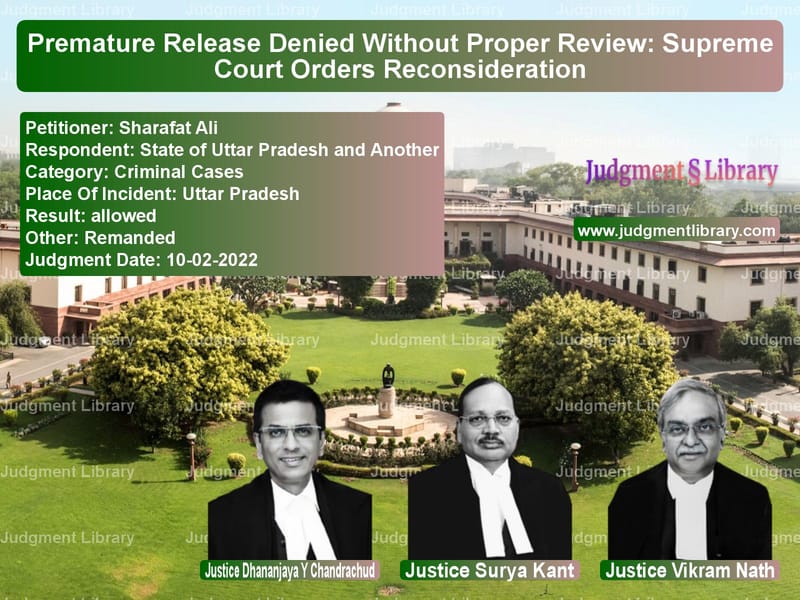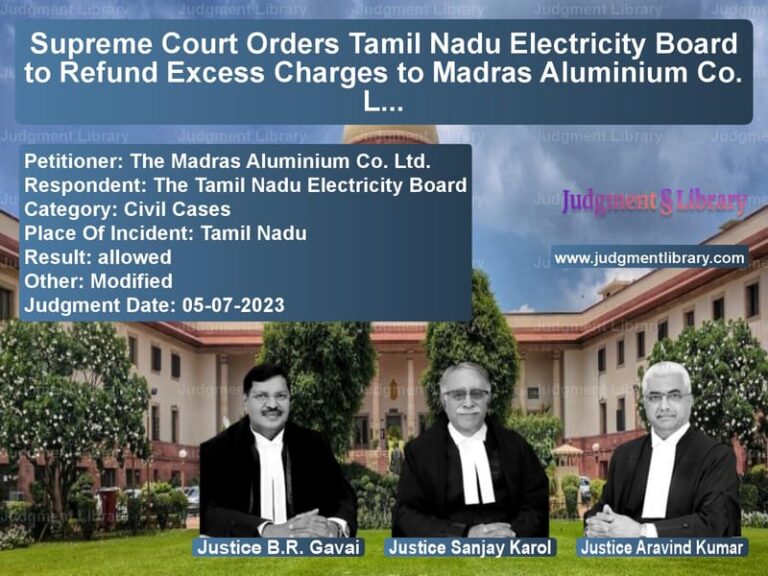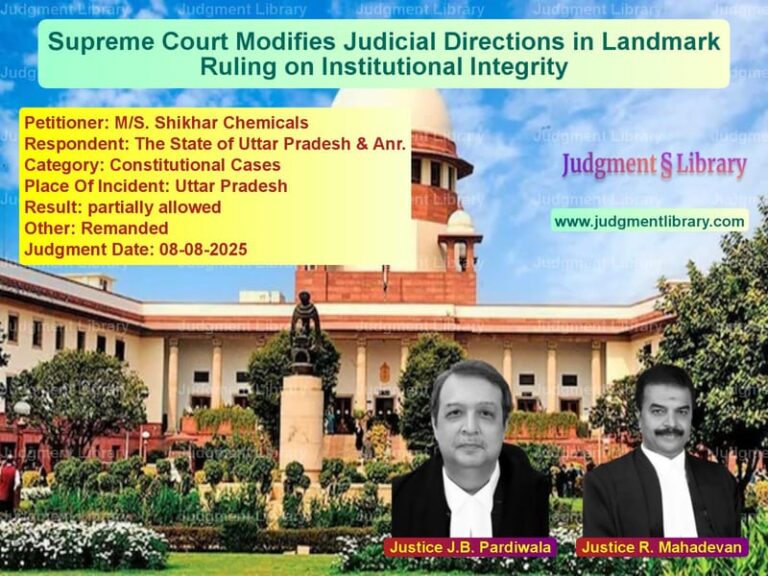Premature Release Denied Without Proper Review: Supreme Court Orders Reconsideration
The case of Sharafat Ali vs. State of Uttar Pradesh brings to light a crucial issue regarding the premature release of convicts. The Supreme Court ruled that the Uttar Pradesh government’s rejection of the petitioner’s premature release was flawed due to the non-application of mind and failure to consider relevant factors.
Background of the Case
Sharafat Ali was convicted on January 17, 2005, under Section 302 read with Section 34 of the Indian Penal Code (IPC) for murder and was sentenced to life imprisonment. His conviction was upheld by the Allahabad High Court on June 3, 2016, and later, the Supreme Court dismissed his Special Leave Petition on April 20, 2018.
After spending 17 years, 9 months, and 26 days in prison, Sharafat Ali applied for premature release. His application was rejected on July 30, 2021, by the Government of Uttar Pradesh, citing potential resentment among the victim’s family and concerns that he might commit further offenses.
Government’s Reasoning for Denying Premature Release
The rejection order by the Uttar Pradesh government was based on reports from the District Magistrate and Superintendent of Police, Amethi, which stated:
- The petitioner’s premature release could cause resentment among the victim’s family.
- There was a possibility that the petitioner might re-offend.
- He was described as having an “extremist nature.”
However, the Supreme Court found that this decision lacked an application of mind and failed to consider essential factors such as:
- The petitioner’s conduct and behavior during his incarceration.
- His criminal record beyond the current conviction.
- Whether his release posed a direct threat to society.
Petitioner’s Arguments
Sharafat Ali’s counsel argued that:
- He had already served over 17 years in prison and was eligible for premature release.
- The rejection of his application was based on vague and generalized observations rather than specific concerns.
- The state was required to assess his application based on the premature release policy applicable at the time of his conviction in 2005, not any subsequent policy changes.
State of Uttar Pradesh’s Arguments
The counsel for the State of Uttar Pradesh defended the rejection, arguing that:
- There was a strong possibility that the petitioner might engage in criminal activities if released.
- Allowing his release could disturb the peace in the victim’s community.
- The police and administrative authorities had assessed the potential risk before denying the application.
Supreme Court’s Ruling
The Supreme Court ruled in favor of Sharafat Ali, setting aside the rejection order. The Court criticized the state government for failing to apply its mind and for issuing a generic rejection without considering individual circumstances.
The judgment stated:
“The order which has been passed by the State government in the present case is bereft of an application of mind to relevant circumstances bearing on whether the petitioner should be released prematurely.”
The Court further emphasized:
“The order does not contain any reference whatsoever to whether the petitioner possesses any prior criminal history, save and except for the present case. Similarly, the order is completely silent on the conduct and behavior of the petitioner in jail after he was convicted of the offense.”
Directions Issued by the Supreme Court
The Supreme Court issued the following directives:
- The rejection order dated July 30, 2021, was set aside.
- The state government must reconsider Sharafat Ali’s premature release application based on the policy in effect in 2005, the year of his conviction.
- The reconsideration must include all relevant factors, including his behavior in prison and potential risk to society.
- The entire process must be completed within two months of the Supreme Court’s judgment.
Significance of the Judgment
This ruling highlights key legal principles:
- Authorities must conduct a thorough review before denying premature release.
- Decisions should be based on clear, case-specific factors rather than generic concerns.
- Government policies at the time of conviction should govern premature release decisions, preventing retrospective application of restrictive laws.
Conclusion
The Supreme Court’s ruling in Sharafat Ali vs. State of Uttar Pradesh underscores the need for a fair, reasoned approach in premature release cases. The decision ensures that authorities cannot arbitrarily deny release based on broad assumptions. Instead, a detailed evaluation of an inmate’s conduct and risk assessment must be undertaken, providing a precedent for future cases involving premature release applications.
Petitioner Name: Sharafat Ali.Respondent Name: State of Uttar Pradesh and Another.Judgment By: Justice Dhananjaya Y Chandrachud, Justice Surya Kant, Justice Vikram Nath.Place Of Incident: Uttar Pradesh.Judgment Date: 10-02-2022.
Don’t miss out on the full details! Download the complete judgment in PDF format below and gain valuable insights instantly!
Download Judgment: sharafat-ali-vs-state-of-uttar-prade-supreme-court-of-india-judgment-dated-10-02-2022.pdf
Directly Download Judgment: Directly download this Judgment
See all petitions in Bail and Anticipatory Bail
See all petitions in Judgment by Dhananjaya Y Chandrachud
See all petitions in Judgment by Surya Kant
See all petitions in Judgment by Vikram Nath
See all petitions in allowed
See all petitions in Remanded
See all petitions in supreme court of India judgments February 2022
See all petitions in 2022 judgments
See all posts in Criminal Cases Category
See all allowed petitions in Criminal Cases Category
See all Dismissed petitions in Criminal Cases Category
See all partially allowed petitions in Criminal Cases Category







